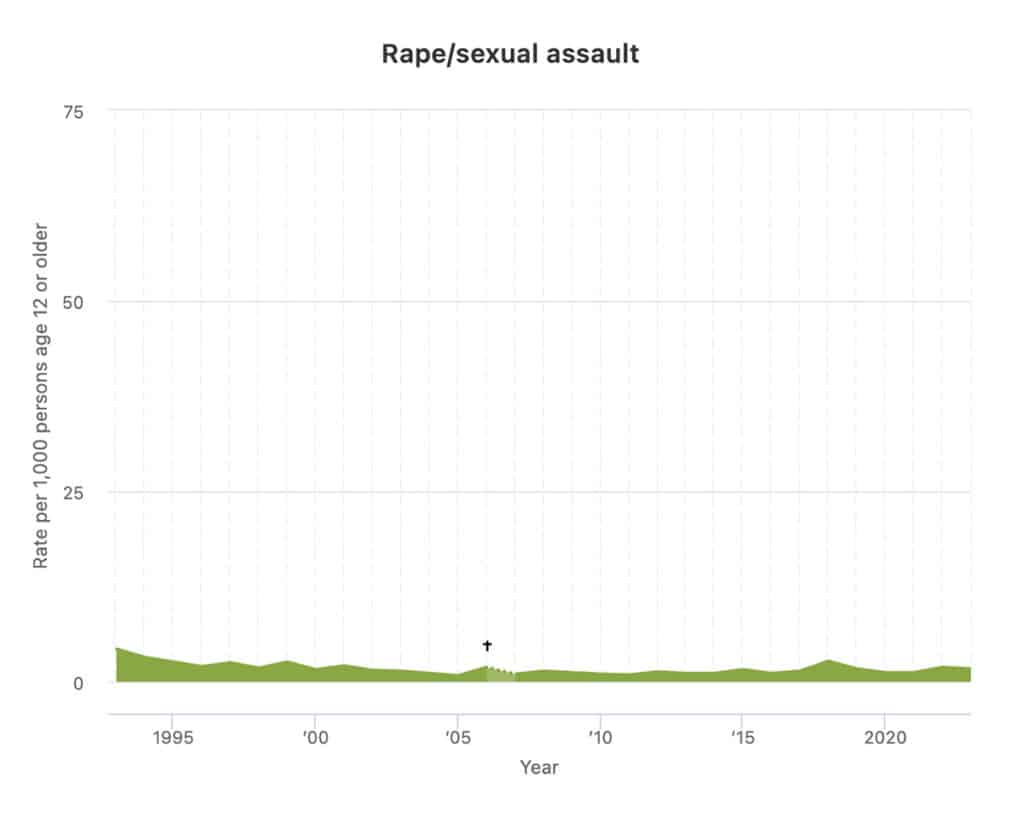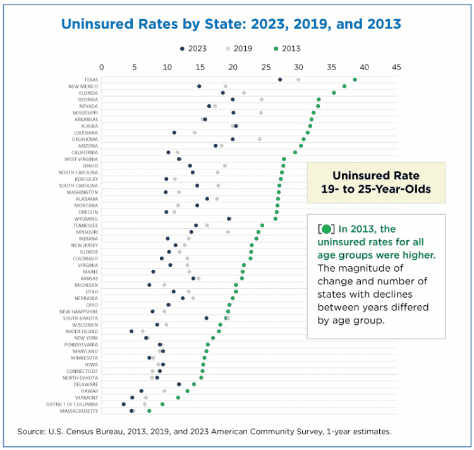Volcanoes are erupting in The Philippines, but on-fire Australia received some welcome rain. The Iran war cries have been called off and The Donald’s military powers are about to be hamstrung by the Senate. Meanwhile, his impeachment trial is starting, and we’re all on Twitter for a front-row seat.
What Could Go Right? More Insurance, Less Violence
Two big American accomplishments are passing under the radar.
This is our weekly newsletter, What Could Go Right? Sign up here to receive it in your inbox every Thursday at 5am ET. You can read past issues here.
More Insurance, Less Violence
Two big American accomplishments are passing under the radar this week. They are both based on freshly released data, but “old news” in that the change they represent mostly occurred years ago. They deserve attention now anyway, especially since neither of them is well-known enough to have entered the common narrative.
Women Are Safer
Last Friday, September 13th was the 30-year anniversary of the passage of The Violence Against Women Act (VAWA). VAWA was the “first federal legislative package to designate domestic violence and sexual assault as crimes,” reports PBS. Signed into law by President Bill Clinton, passed with bipartisan support in Congress, and written and championed by President Joe Biden, who was at that time a United States Senator, the law put into place several measures that aimed to bring domestic violence out of the shadows and provide support to its victims. It created, for example, the National Domestic Violence Hotline.
Speaking last week at an event to mark the anniversary, Biden called the act his “proudest legislative achievement” and said that his goal was not only to change the law, but also “the culture of America.”
A politician’s lofty words are one thing. Numbers are another. And the ones that the White House provided on the occasion of the anniversary, courtesy of the Federal Bureau of Investigation (FBI), were jaw-dropping: between 1993 and 2022, annual domestic violence rates dropped by 67 percent, and the rate of rapes and sexual assaults by 56 percent.

On the one hand, these figures shouldn’t be surprising. They are part of a national trend of declining violent crime rates that started in the 90s and has remained basically flat since 2010, notwithstanding individual years that have been uncommonly high or low. On the other hand, they are a compelling tribute to everyone who has come together to truly move American culture forward: the victims themselves, their advocates, the police and the criminal justice system, and legislators.
Many More People Are Insured
The US has had an insurance problem for as long as anyone can remember. While issues remain, one has seen dramatic improvement since 2013. That is the nation’s uninsured rate, which a new report from the US Census Bureau breaks down into three age groups: children under 19, working-age adults, and adults over 65.
Between 2013 and 2023, the uninsured rate among children declined from 7.5 percent to 5.4 percent. Among working-age adults, it dropped from 20.5 percent to 11 percent. And among older adults, it has remained low and stable, at around one percent.
Combined, the percent of the entire American population that has insurance coverage of some type is now 92.1 percent. Universal coverage, it is not, but it’s likely a higher figure than many think.
Reporting macro data like that obscures a lot, like when, how, and where these declines occurred. They were mainly between 2013 and 2019, when uninsured rates for working-age adults, the majority of the population, dropped in all 50 states. If you are wondering whether this was a result of Obamacare, more officially known as the Affordable Care Act (ACA), ding, ding, ding—you are a winner, baby. “Nearly 50 million Americans have been covered by health insurance plans through the ACA’s marketplaces since they opened a decade ago,” reports The New York Times, citing data from the Treasury Department ($).
Uninsured rates declined between 2019 and 2023 as well, due to government action around the pandemic to prevent lapses in health insurance coverage, but state-by-state it was more of a mixed bag.

Tracking change across time has always been difficult. It’s even more difficult these days, since our modern media environment bombards us with new information on a daily or even hourly basis. Many have a sense that the America of today is different from the one of yesterday—more fractured, more toxic, more . . . worse. Less believed, but no less true, is that it is different, but also better.
What Could Go Right? S6 E21

Are Americans really opposed to immigration? Zachary and Emma speak to author and professor Zeke Hernandez about immigration in the US, and how it impacts the culture and economics of our society. They talk about the current legal immigration system and how the failures therein lead to illegal immigration, and discuss how public perception around immigration is distorted by politics and incentives driven by a vocal minority. They also touch on the failure of the most recent bipartisan legislation and how it targeted enforcement over reform, and also what comprehensive immigration reform might look like if the needs of the US economy shift in the future. | Listen now
By the Numbers
750: The number of new species recognized in Australia, among them a marine worm named after Planet Earth narrator David Attenborough (officially, Marphysa davidattenboroughi).
75: The percentage of Portugal’s electricity that came from renewable energy (hydropower, wind, solar, and biomass) in the first eight months of 2024.
7K: The amount of refined metals, measured in a million metric tons, needed to reach net-zero emissions by 2050, as opposed to the over 8k of coal extracted from the earth in 2023 alone. (Bloomberg $)
Quick Hits
🦠 Along with guinea worm, we are close to consigning another disease to the dustbin of history: sleeping sickness. The World Health Organization is aiming to eliminate it by 2030.
🏷️ Prices are still rising, but much more slowly than they once were. A new report from the Labor Department shows that inflation fell to 2.5 percent from last August, a number not seen since 2021 and down from a peak of 9.1 percent in 2022.
🧑🚀 The first private spacewalk in history has been successfully completed, bringing back data for 36 experiments that may move the science of space forward. Nature explains some of them here. Among them are testing the effects of space on the human body and spacesuits that may one day be able to be produced at a mass scale.
👁️ The recipient of the first-ever partial face and whole eye transplant, a 47-year-old father from Arkansas, is recovering nicely. While he lacks vision in the transplanted eye, the eyeball itself is still healthy, in that the retina responds to light. The man can also now grow facial hair and eat, smell, and talk normally again.
🧠 A pregnant neuroscientist scanned her brain 26 times during her pregnancy, creating the “first detailed map of a woman’s brain throughout gestation,” reports The Associated Press. It’s the first step of an international research project that will scan the brains of pregnant women on a large scale, looking for clues about disorders such as postpartum depression.
🌍 Finland is building the world’s largest heat pump. Britain has introduced new legislation to crack down on water polluters. And globally, we’re starting to see mega installations of agrivoltaic projects, where solar energy and food are produced on the same tract of land.
🌱 Pesticides, one of the most common ways to commit suicide, were implicated in roughly a third of suicide fatalities in Nepal. After the country banned the sale and import of 10 of them, reported deaths fell by 30 percent.
📚 This fall, Massachusetts becomes the 20th state to offer tuition-free community college regardless of age, income, or GPA. Tennessee was the first to pioneer this approach in 2017.
📉 An update on our newsletter edition from August about whether opioid deaths are finally falling in the US: new figures from the Centers for Disease Control and Prevention show that deaths from opioid overdoses have dropped by more than 10 percent.
📬 And, just for fun: the US Postal Service has unveiled their newly designed fleet. The roomier, safer mail trucks have air conditioning for the first time, among other improvements. A substantial share are also electric. See the new trucks here.
👀 What we’re watching: The Australian government is considering setting a minimum age, possibly 16, for children to access social media platforms.
💡 Editor’s pick: When it comes to solving climate change, systematic vs. individual change is a false binary, writes Hannah Ritchie. Rather, the two are a reinforcing feedback loop.
TPN Member Originals
(Who are our Members? Get to know them.)
- What John Stuart Mill knew about happiness | The Atlantic ($) | Arthur C. Brooks
- A second Trump assassination attempt | Tangle | Isaac Saul
- Does the world need America? | The Edgy Optimist | Zachary Karabell
- How a cultural shift favors Harris | NYT ($) | David Brooks
- When the “strongman” is challenged by a strong woman | Lucid | Ruth Ben-Ghiat
- Social-media companies‘ worst argument | After Babel | Jonathan Haidt
- A ‘dopamine fast’ will not save you from addiction | NYT ($) | Maia Szalavitz
- Harvard, Brown, and other top schools are thinking about black freshmen the wrong way | NYT ($) | John McWhorter
- The federal government should unleash DC housing | Slow Boring | Matthew Yglesias
 Mentava founder Niels Hoven on accelerating kids’ education | Faster, Please! | James Pethokoukis
Mentava founder Niels Hoven on accelerating kids’ education | Faster, Please! | James Pethokoukis- Macron has put France’s fate in Le Pen’s hands | GZERO | Ian Bremmer
 Mark Kelly on the new space race | GZERO | Ian Bremmer
Mark Kelly on the new space race | GZERO | Ian Bremmer- George Bush’s time bomb goes off | Nonzero | Robert Wright
- In tense Kyiv, Ukrainians fear the war could be decided within months | WaPo ($) | Fareed Zakaria


